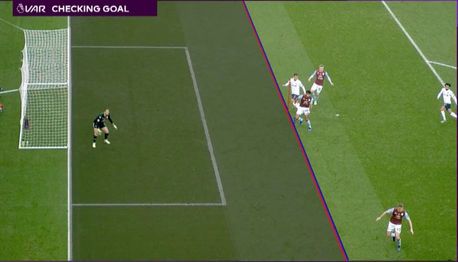I am afraid this is another negative assessment of the ongoing circus that is VAR in the Premier League. I have previously address the topic here, here and here. The more I see of VAR, the more I believe the game would be better off without it. Here's why.
I watched the Aston Villa versus Liverpool game last Saturday afternoon. During the first half Liverpool's Roberto Firmino had a goal disallowed for offside. The assistant referee raised his flag as the Liverpool striker kicked the ball into the net. This in itself has become unusual, as more often than not this season, assistant referees have not raised the flag and allowed VAR to decide whether the goal should stand.

Upon seeing this, my reaction was that the decision would be overruled and the goal awarded. Instead VAR confirmed the original offside decision, and the score remained 1-0 to Aston Villa.
Why this was the case remained a mystery to me, as it seemed Roberto Firmino was behind the last defender and therefore onside.
"Liverpool's Roberto Firmino was flagged offside before putting the ball in the net against Aston Villa and the decision was confirmed by VAR. The red line signifies Firmino and was aligned to his armpit, which was marginally ahead of the last Villa defender".
Firmino's armpit. In more than 30 years of watching football, I have yet to see a goal scored with an arm pit.
However, the problem with this runs deeper. As was suggested to me (and I agree), had this been last season, prior to the introduction of VAR, those in favour of the technology would have used this as an example why VAR was needed. They would have argued that Firmino was onside and the goal should have been awarded. Yet, with VAR, the outcome remained the same.
There is other unintended consequences too. I have spoken about such economic consequences from rule changes in rugby, horse racing and sports broadcasting previously. The Premier League's use of VAR has really opened up Pandora’s Box. In Greek mythology, this represented a gift which seems valuable but which in reality is a curse. Sounds a little like VAR.
When a goal is now scored, I believe the reaction of players and fans is somewhat mooted. The goal is effectively "delayed" until VAR approves it. In fact, the referee is no longer in control of the game, but rather carry's out the orders of those in Stockley Park - the home of VAR. Other sports only consult VAR when the referee requests such.
This leads to a second order implication. Differences in referee power-relationships and experience levels must exist. Is the match referee one with 10+ years’ experience in the Premier League or a rookie? Is the referee in Stockley Park new to the Premier League or a seasoned pro? Working in academia one would experience this in many forums. For example, comments on a paper presented at a conference or external examiner comments. The experience of the academics both delivering and receiving the comments are crucial in this regard.
Another implication is the officials are now working under a different sets of rules. In the Carabao Cup recently there was no VAR. Arsenal scored a goal which VAR would have disallowed. The world didn't end because of this and Liverpool went on to win the game. I wonder to what extent the assistant referee's failure to see this (relativity) straightforward offside is influenced by VAR in the Premier League. Are officials losing confidence? Running the line is challenging and one can also assume how hard this has become under two different sets of rules.
My hope is that the VAR experiment will end. I am very much in favour of technology in sport, but only where it improves the game. Goal-line technology has been flawless and is an excellent addition to the game. VAR's introduction has not been the same. My hope is appropriate in this regard because the last thing to come from Pandora’s Box was Hope.
 RSS Feed
RSS Feed